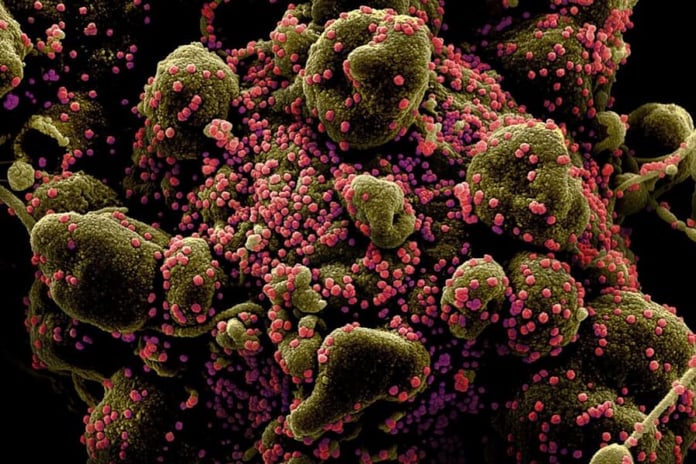
Some doctors’ offices now offer blood tests that are designed to provide information about a previous Sars CoV-2 infection. The quality of some tests leaves something to be desired, but others seem to prove themselves.
Anyone who had a fever or cough a few weeks ago thinks or hopes that it was a Sars-CoV-2 infection because then the disease would have been overcome. Because there were not enough tests, many could not be tested at the time. But they can make up for it because doctor’s offices now offer antibody tests. These show whether a person has survived the disease and has developed antibodies against the viruses. Unlike the virus test, for which a throat swab is sufficient, a blood sample must be taken for this, which is why the tests are also called blood tests.
Many different antibody tests are currently available. But not all of them are suitable for this purpose. Researchers led by Manuel Dohla and Hendrik Streeck from the University of Bonn examined a rapid antibody test that works similar to a pregnancy test and delivers a result within 20 minutes. To the disappointment of the researchers, the accuracy was much worse than the company said.
The researchers did not test the blood of critically ill patients, as the companies usually do when evaluating the tests, but that of 49 people from the population. Some of them were healthy, 22 were infected with the virus – a virus test had confirmed – but many of them had only mild symptoms. However, the antibody test was only positive in 36 percent of those infected. And it was only negative in 89 percent of the non-infected. For a precise determination of the accuracy, the researchers should have examined a larger group. But it is still clear that the test does not make sense for this application, says Dohla.
The judgment of a Danish is a slightly better Study that compared nine other antibody tests. These included three so-called Elisa tests, which can only be evaluated in the laboratory, and six rapid tests, which do not require any special equipment for evaluation. Because the study has not yet been published, the results should still be used with caution. But an Elisa test from China got pretty good results: sensitivity of 93 percent – so many positive samples were correctly identified – and a specificity of 100 percent – all negative samples were correctly identified. Three of the quick tests performed similarly.
In contrast, the worst Elisa test achieved a sensitivity of 67 percent and a specificity of 96 percent. This means that 33 out of 100 infected people get a wrong result and 4 out of 100 non-infected people wrongly get a positive result. The quality of the tests is therefore very different.
Because there are still many questions regarding the quality of the tests, use outside of studies is not safe, writes the FMH, the association of Swiss doctors, on request. Some doctors also warn that a positive result cannot be interpreted in such a way that the person concerned can then throw all precautionary measures overboard. Although there are many indications that those who have recovered are subsequently immune to being infected again, there have not yet been any studies that have examined this in detail.
With the support of the Federal Office of Public Health, a network of twelve Swiss universities is currently launching an epidemiological study in which, among other things, the question of immunity is examined and antibody tests are validated. To this end, around 65,000 people will be tested and tested for antibodies in stages throughout October 2020. Until the results become known, the laboratories must validate their antibody tests themselves.
And some of them do it conscientiously. In a laboratory in Zurich, all samples are tested with two different antibody tests as standard. Only one test is billed. The second, a quick test, serves as an internal control. If a test is positive, it will also be sent to the virology department at the University of Zurich, which uses another antibody test, says the manager. So far, a high level of agreement has been observed in the tests. There are rarely cross-reactions in which the test reacts to specific antibodies against other pathogens, but only in one test at a time.
In a doctor’s office in Lucerne, on the other hand, it is considered excessive to carry out two antibody tests as standard. Only if there is a positive result is the patient recommended to have another test performed. Concerning the question of immunity, the doctors explain to their patients that if the test is double-positive, they are very likely to be immune to a second infection in the current wave.
Doctor Phillip Katumba, head of the Sihlmed medical center in Zurich, states that the question of immunity arises not only from the antibody test but also if you do a virus test during the illness. “It is still important for many patients to know whether they have been infected,” he says. The antibody test gives them the same certainty that those who have been tested during illness have.
Katumba also points out that the classic virus test can also give incorrect results. It happens again and again that patients have Covid-19, but the virus test is negative. This happens especially when patients can only be tested later in the course of the disease – one or two weeks after the first symptoms have appeared. In some patients, the virus can only be found in the lungs. In contrast, it can no longer be detected in the throat swab. Then the antibody test can give clarity. The Sihlmedzentrum has been offering these tests for almost two weeks now. All samples are also examined with at least two different antibody tests.











